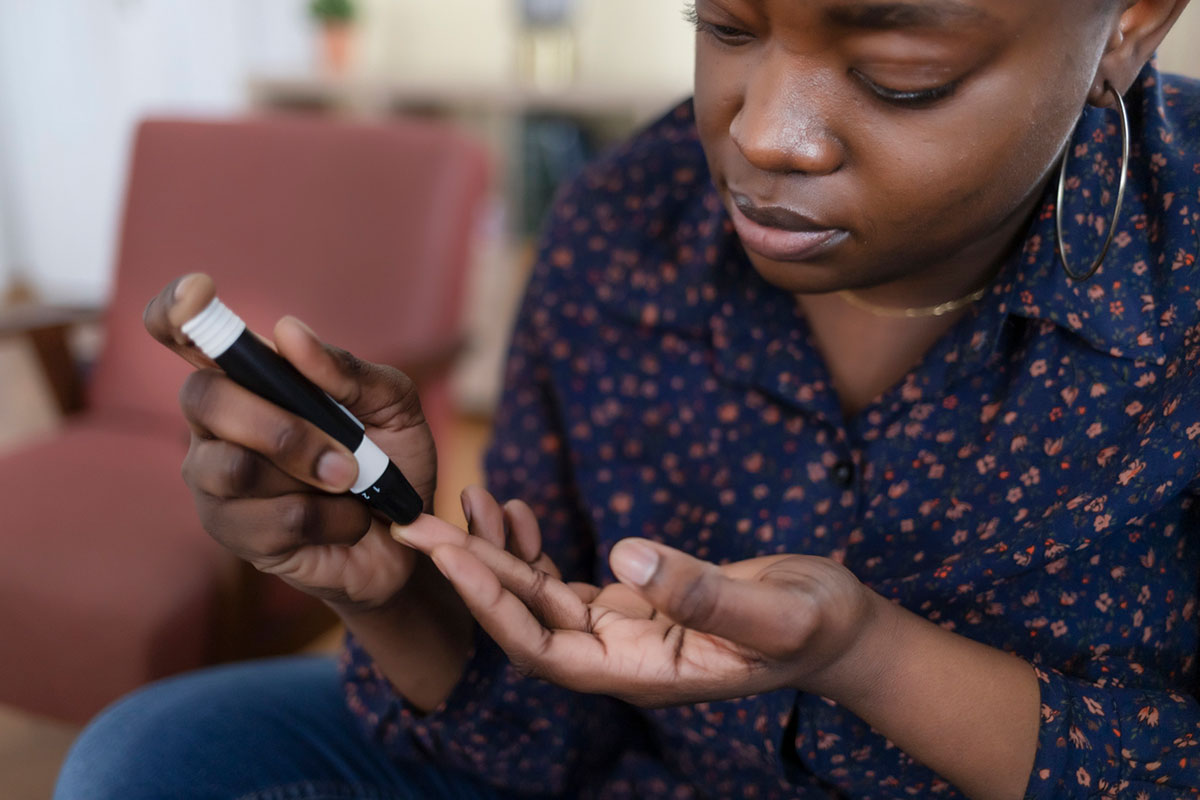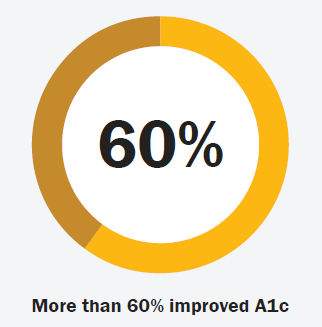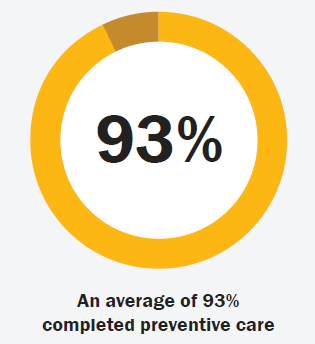WellSpark diabetes management participants improved their health and wellbeing

Three years of data shows lowered A1c levels, improved adherence to preventive care screenings, and decreases in diabetes distress scores.
WellSpark Health’s Diabetes Self-Management Education and Support (DSMES) programs connect individuals diagnosed with type 2 diabetes to health coaches who focus on weaving effective diabetes self-management practices into daily habits, which can lead to sustainable improvements.
Annually, WellSpark evaluates the aggregate results of the company’s diabetes management programs for all participants from its employer client groups. Across three years of data, from the beginning of 2021 through the end of 2023, these health coaching programs demonstrated consistent improvement in health and wellbeing for people living with diabetes, including mitigating the potential negative effects of this chronic condition.

Lowering A1c for the win
According to the Centers for Disease Control and Prevention (CDC), A1c is a blood test that measures a person’s average blood sugar levels over the past three months. It’s a common test for diagnosing prediabetes and diabetes and is one of the main tests to help individuals and their health care team manage diabetes1. Even a slight reduction in A1c levels translates to lower medical costs and fewer deaths. A 1% drop in A1c translates to a 15-20% decrease in the risk of heart attack or stroke2. A 1% drop in A1c also translates to a 25-40% reduction in the risk of diabetes-related eye or kidney disease2.
More than 60% of participants in WellSpark’s 12-month diabetes management programs improved their A1c over the last three years, lowering it by an average of 1.4%.
“I have been able to lose a total of 44lbs incorporating healthy food and exercise on my own. I have learned about my diabetes and decreased my A1c from 8.9 to 5.9 over the past year. I’ve learned a lot about reducing carbohydrates which had been a problem for me, because rice was a huge part of my life and my culture. It was great to ask questions and have the nurse wellness coach available to me without judging me.”
A participant in WellSpark’s one-on-one DSMES health coaching program
Prioritizing preventive care
The CDC states that preventive care services could save more than 100,000 lives in the U.S. each year3. Chronic diseases alone, such as diabetes, heart disease, and cancer, are responsible for 7 out of 10 American deaths annually4. Yet, many people in the United States don’t get recommended preventive healthcare services, even though these services are often available at no charge for individuals who have health insurance.

Diabetes presents daily demands – managing blood sugar levels, diet, and a complex medication routine – making adherence to recommended preventive care screenings additionally challenging.
Because preventive care is an important part of overall wellbeing, adherence to recommended screenings is an important data point to track. Over the past three years, WellSpark’s diabetes management program participants’ overall adherence to diabetes-related preventive care services was above average at 93% or more. These services include physician follow-up visits, foot care visits, retina eye screenings, and kidney function screenings. National averages for these services range from 51% to 91%.
Decreasing diabetes disease distress
The most common psychological issue among those with diabetes is Diabetes Disease Distress – an emotional response to diabetes, including increased worry, stress, concern, and fear among people struggling to manage the disease. According to the National Institute of Health, individuals with a reduction in diabetes-related distress had significantly greater improvement in A1c, medication adherence, self-care activities, and self-confidence5. And a 1% reduction in A1c was associated with a 13% reduction in diabetes-related total healthcare costs6. Over the past three years an average of 32% of WellSpark program participants reported reduced disease distress because of the program’s support.
Future cost avoidance
Diabetes can be costly to individuals with the disease as well as for employers who provide health insurance coverage. WellSpark’s accredited diabetes management programs, verified by the Association of Diabetes Care and Education Specialists (ADCES), are focused on future cost avoidance, help individuals make lifestyle and behavioral changes that improve their overall wellbeing, and can lower their cost of care. WellSpark works closely with employers to tailor programs to the unique needs of each workforce, incorporating variations of one-on-one and group health coaching options.
“While not exclusively a workplace problem, employers have a unique opportunity to address diabetes and its biological, psychological, and social factors that impact the health of their workforce. By taking action and bringing essential diabetes resources to their workforce, employers can improve overall employee health and wellbeing while also better managing healthcare costs.”
Andi Campbell, President of WellSpark Health
In addition to tracking the data shared here ― A1c levels, preventive care adherence, and diabetes disease distress ― the majority of WellSpark disease management participants also improved their blood pressure, lost weight, and adhered to diabetes self-monitoring guidelines.
By taking time to really understand the sum of everything in a person’s life ― the biological, psychological, and social factors ― WellSpark’s health coaching programs help individuals unlock the barriers that prevent them from making lasting change, give them the support they need to form new health and wellbeing habits, and better manage their diabetes.
Learn more about the disease management health coaching programs WellSpark offers: https://www.wellsparkhealth.com/solutions/
Sources:
[1] Center for Disease Control and Prevention, Retrieved March 21, 2024 from https://www.cdc.gov/diabetes/managing/managing-blood-sugar/a1c.html
[2] A −1% change in absolute % HbA1c translates to 21% fewer deaths from stroke, 37% fewer eye and kidney complications, and 14% fewer heart attacks. Using the Milliman model; this −1.6% change in mean A1c (in the study population) converts to an estimated cost savings of $192,110 for a 12-month period or $1,256 annual savings per member in program; Diabetes management with a care coordinator improves glucose control in African Americans and Hispanics, Wayne S. Rawlins, Michele A. Toscano-Garand, and Garth Graham; J Educ Health Promot. 2017 May 5;6:22.
[3] Center for Disease Control and Prevention (2020) Access to Health Care, Retrieved March 21, 2024 from https://www.cdc.gov/vitalsigns/healthcareaccess/
[4]Center for Disease Control and Prevention (2023) National Center for Chronic Disease Prevention and Health Promotion (NCCDPHP). Retrieved March 21, 2024, from https://www.cdc.gov/chronicdisease/center/index.htm
[5] National Institute of Health, Retrieved March 22, 2024 from https://www.ncbi.nlm.nih.gov/pmc/articles/PMC5398174/
[6] Nation Institute of Health, Retrieved March 22, 2023 from https://www.ncbi.nlm.nih.gov/pmc/articles/PMC8873294/